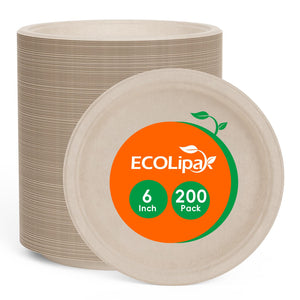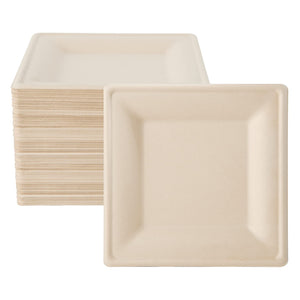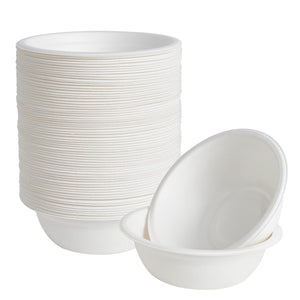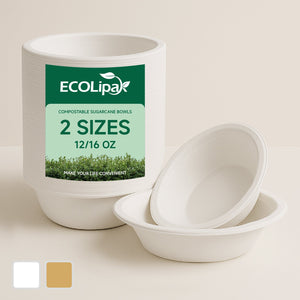Ready to boost your health and help the planet in 2025? The eco-friendly Mediterranean diet merges heart-healthy eating with sustainable choices. This powerful anti-inflammatory diet helps you achieve personal wellness goals, like managing weight and preventing disease. You also reduce your environmental impact, as food production creates significant emissions. This guide makes the Mediterranean lifestyle simple for beginners. You can embrace this anti-inflammatory diet for total wellness. This anti-inflammatory diet is a great choice. Even your kitchen tools, like compostable sugarcane bowls or Sugarcane Compostable Bowls, can be part of a healthier Mediterranean journey.
Key Takeaways
-
Eat more plant-based foods like fruits, vegetables, and whole grains. These foods help your body fight inflammation.
-
Choose healthy fats like olive oil and lean proteins like fish. These choices are good for your heart and reduce inflammation.
-
Make small changes, like swapping unhealthy oils for olive oil. This helps you stick to the diet over time.
-
Reduce red meat, sugary drinks, and processed foods. These items are bad for your health and the planet.
-
Use eco-friendly kitchen items, like compostable bowls. This helps the environment and supports your healthy eating.
Core Principles of the Mediterranean Diet
The Mediterranean diet is more than just a list of foods; it's a lifestyle built on simple, powerful principles. You can easily adopt these habits for better health. This approach is a fantastic anti-inflammatory diet that helps fight chronic inflammation.
Focus on Plant-Based Foods
You should make plants the star of your meals. The Mediterranean way of eating is full of delicious whole foods. Aim to eat plenty of fruits and vegetables every day. A good goal is three servings of fresh fruits and three to four servings of vegetables. These nutrient-dense foods are essential for an anti-inflammatory diet and help your body combat chronic inflammation. Loading your plate with these foods is a key step. This anti-inflammatory diet is rich in vitamins that fight chronic inflammation.
Choose Whole Grains Over Refined
You should swap refined grains for whole grains. Whole grains contain the entire kernel—bran, germ, and endosperm. This means they have more fiber and nutrients. Refined grains lose these parts, even if some vitamins are added back later. Choosing whole grains is a simple way to support an anti-inflammatory diet and reduce inflammation.
|
Nutrient/Component |
Whole Grains |
Refined Grains |
|---|---|---|
|
Kernel Parts |
Bran, Germ, Endosperm |
Endosperm only |
|
Fiber |
Rich |
Significantly reduced |
|
B Vitamins |
Present |
Reduced (some added back) |
|
Magnesium |
Present |
Reduced |
Embrace Healthy Fats and Olive Oil
You can enjoy healthy fats without guilt. Extra virgin olive oil is the main source of fat in the Mediterranean diet. It is packed with antioxidants called polyphenols. These compounds help protect you from chronic inflammation. Using olive oil for cooking and dressings is a cornerstone of this anti-inflammatory diet. These healthy foods help reduce inflammation.
Opt for Lean Proteins like Fish
You should choose lean proteins, especially fish. The Mediterranean diet includes fish like salmon, cod, and sardines at least twice a week. These foods provide high-quality protein without the saturated fat found in red meat. Including these lean proteins is a smart move for your wellness and a great part of an anti-inflammatory diet that helps manage chronic inflammation.
An Anti-Inflammatory Diet for Wellness
This entire way of eating is a powerful anti-inflammatory diet. Chronic inflammation is linked to many diseases. The Mediterranean diet helps lower markers of inflammation in your body. Studies show it can significantly decrease factors like C-reactive protein (CRP). For people with conditions like rheumatoid arthritis, this anti-inflammatory diet can reduce joint pain and stiffness. Adopting these principles helps your body fight chronic inflammation. It is a proven anti-inflammatory diet for long-term health. This anti-inflammatory diet is your best defense against chronic inflammation. You are choosing a lifestyle that actively fights chronic inflammation.
Simple Steps to Get Started Today
Starting the Mediterranean diet is easier than you think. You don't need to change everything overnight. These easy steps will guide you, helping you build healthy habits that last. This journey is about making small, smart choices that lead to big results for your health. Following these easy steps will help you embrace this powerful anti-inflammatory diet and fight chronic inflammation.
Step 1: Make One Swap at a Time
The best way for beginners to start is by making one simple swap at a time. Focus on replacing less healthy items with delicious Mediterranean alternatives. This gradual approach makes the transition feel natural and sustainable. Each swap is a step toward a better anti-inflammatory diet.
Tip: Try one new swap each week! Before you know it, your kitchen will be filled with healthy and flavorful foods.
Here are a few simple swaps to get you started:
-
Swap Vegetable Oil for Olive Oil: Use extra virgin olive oil for dressings and regular olive oil for cooking. It's a key part of this anti-inflammatory diet.
-
Swap Creamy Dressings for Vinaigrette: Make your own simple dressing with olive oil and vinegar. It’s healthier and tastes fresher.
-
Swap Red Meat for Chicken: When you want meat, choose lean proteins like chicken. This helps you avoid the saturated fats often found in red meat.
-
Swap Butter on Potatoes for Olive Oil and Yogurt: Drizzle olive oil and add a scoop of plain Greek yogurt to your baked potatoes.
-
Swap Flavored Yogurt for Plain Yogurt: Choose plain yogurt and add your own fresh fruits and a drizzle of honey. This avoids added sugars and gives you more control over your foods.
Step 2: Make Vegetables the Star of Your Plate
In the Mediterranean way of eating, vegetables aren't just a side dish—they are the main event. Filling your plate with colorful vegetables is a cornerstone of this anti-inflammatory diet. It ensures you get plenty of vitamins and fiber, which are essential for fighting chronic inflammation.
You can try making one-pan healthy meals where vegetables shine. Here’s a simple recipe to get you started:
Easy Mediterranean Roasted Vegetables
-
Preheat your oven to 400°F (200°C).
-
In a large bowl, mix a bit of tomato paste, extra-virgin olive oil, minced garlic, salt, and pepper.
-
Chop up some potatoes, zucchini, and bell peppers. Add them to the bowl and toss to coat.
-
Spread the vegetables on a baking sheet and roast for about 25 minutes.
-
Add a handful of cherry tomatoes and pitted olives, stir, and roast for another 20 minutes until tender.
-
Sprinkle with fresh parsley and basil before serving.
This dish is a perfect example of how delicious an anti-inflammatory diet can be. You can also explore other vegetable-forward foods like an authentic Greek salad (Horiatiki) or a savory Zucchini Pie with Feta. Making vegetables the focus is a key strategy to reduce inflammation and combat chronic inflammation.
Step 3: Cook with Healthy Fats
Healthy fats are your friend on the Mediterranean diet. Olive oil is the star, but it's important to know which type to use for different kinds of cooking. Using the right oil ensures you get the best flavor and health benefits. This is a crucial part of maintaining an effective anti-inflammatory diet and managing chronic inflammation.
For dressings, dips, and finishing dishes, use Extra Virgin Olive Oil (EVOO). It has a bold flavor and its delicate compounds are best preserved without high heat. For higher-heat cooking like sautéing or roasting, a regular Olive Oil or Avocado Oil is a great choice because they have higher smoke points.
Here’s a quick guide to the smoke points of common oils. A higher smoke point means the oil can get hotter before it starts to break down.
|
Fats and Oils |
Max. Cooking Heat |
Smoke Point |
|---|---|---|
|
Avocado Oil |
High |
520°F |
|
Olive Oil |
High |
390°F-470°F |
|
Peanut Oil |
High |
450°F |
|
Canola Oil |
High |
400°F |
|
Olive Oil (Extra Virgin) |
Medium |
350°F |
|
Flaxseed Oil |
No Heat |
225°F |
Choosing the right fats is a simple but powerful way to support your body's fight against chronic inflammation and stick to a healthy anti-inflammatory diet.
Step 4: Eat Seafood Twice a Week
The Mediterranean lifestyle includes plenty of fish and shellfish. These foods are excellent sources of lean protein and omega-3 fatty acids, which are famous for their ability to fight chronic inflammation. The American Heart Association recommends eating two servings of non-fried fish each week. A serving is about 3.5 ounces, or what might fit in the palm of your hand.
🐟 Pro-Tip: Try grilling salmon with lemon and herbs, baking cod with tomatoes and olives, or adding canned sardines to a salad. These are simple ways to boost your intake of healthy omega-3s and follow this anti-inflammatory diet.
Incorporating more seafood is a delicious way to get the nutrients your body needs to combat chronic inflammation.
Step 5: Snack on Nuts, Seeds, and Fruit
Say goodbye to processed snacks and hello to satisfying whole foods. On the Mediterranean diet, snacking is an opportunity to nourish your body. Nuts, seeds, and fruits are packed with fiber, healthy fats, and antioxidants. They provide steady energy without the sugar crash. This is another delicious aspect of a successful anti-inflammatory diet.
Here are some creative and easy snack ideas:
-
Apple slices with a spoonful of almond butter.
-
A bowl of Greek yogurt topped with fresh berries and a sprinkle of chia seeds.
-
A few dried figs or dates for a natural sweet treat.
-
Whole grain toast topped with nut butter and sliced dried figs.
These simple snacks are not only tasty but also contribute to your anti-inflammatory diet, helping your body manage chronic inflammation. Enjoying these natural foods is a key part of the healthy Mediterranean lifestyle.
Sustainable Practices for a Greener Kitchen
Adopting the Mediterranean lifestyle goes beyond the foods you eat; it extends to how you prepare and store them. Creating a greener kitchen helps you reduce your environmental footprint while fully embracing this healthy, anti-inflammatory diet. Brands like Ecolipak are dedicated to making this transition easier, with a mission to make green living accessible for everyone. You can make simple changes that protect both your health and the planet from chronic inflammation.
Reduce Food Waste with Meal Planning
Meal planning is your secret weapon for saving money, reducing stress, and fighting food waste. When you plan your meals, you buy only what you need, ensuring that fresh, healthy foods end up on your plate instead of in the trash. This is a smart way to stay on track with your anti-inflammatory diet.
Pro-Tip: Keep a running list of what's in your fridge and pantry. Before you shop, check your inventory to avoid buying duplicates. This simple habit makes a huge difference!
Here are a few strategies to get you started:
-
Plan Around Themes: Try "Meatless Monday" or "Fish Friday" to simplify your weekly menu.
-
Use What You Have: Before planning new meals, see what ingredients you need to use up. This prevents waste and challenges you to be creative.
-
Prep in Advance: Chop vegetables or cook grains ahead of time. This makes weeknight cooking faster and helps you stick to your anti-inflammatory diet goals.
-
Create an "Eat First" Bin: Place items that are close to their expiration date in a designated spot in your fridge so you remember to use them. This is a great way to manage foods and combat chronic inflammation.
Choose Sustainable Seafood
The Mediterranean diet encourages eating fish, a key part of a successful anti-inflammatory diet. You can make this practice even better for the planet by choosing sustainable seafood. Overfishing and harmful farming practices can damage our oceans. Luckily, certifications make it easy for you to identify responsibly sourced options.
When you're at the grocery store, look for these labels on packaging:
-
Marine Stewardship Council (MSC): The blue MSC label means the wild-caught fish comes from a fishery that is managed to protect ocean health and prevent overfishing.
-
Aquaculture Stewardship Council (ASC): The green ASC label is for farmed seafood. It ensures the farm protects water quality, biodiversity, and follows fair labor practices.
Choosing seafood with these certifications helps protect marine ecosystems. This ensures that future generations can also enjoy the benefits of these healthy foods, which are vital for fighting chronic inflammation.
Ditch Plastic with Eco-Friendly Containers
Single-use plastics are a major source of pollution. They fill up landfills and break down into tiny microplastics that can enter our food and water systems. Reducing your plastic use is a powerful step toward a healthier lifestyle and a cleaner planet. In fact, switching to reusable containers in food service can cut waste by up to 81%. Many people are making the switch, which is why brands like Ecolipak have successfully sold over 59 million eco-friendly products.
You can easily ditch plastic by choosing better alternatives for food storage:
-
Glass: Glass containers are fantastic because they don't absorb food odors or stains. They are also free from harmful chemicals like BPA, making them a safe choice for your anti-inflammatory diet.
-
Stainless Steel: This option is lightweight, incredibly durable, and won't break if you drop it. Stainless steel is another safe material that won't leach chemicals into your food, helping you avoid triggers of chronic inflammation.
Making this change helps keep your healthy foods pure and reduces your contribution to plastic pollution. It's a win-win for your body's fight against chronic inflammation and for the environment.
Meal Prep with Compostable Sugarcane Bowls
Meal prepping is a cornerstone of the Mediterranean diet, and the right containers make it even easier. While glass and steel are great for long-term storage, sometimes you need the convenience of a disposable option. This is where innovative sustainable tableware comes in.
Instead of plastic, you can choose compostable sugarcane bowls. These are made from sugarcane bagasse, the natural fiber left over after juice is extracted from sugarcane stalks. This renewable resource is transformed into sturdy, reliable bowls.
Ecolipak's Compostable Sugarcane Wide-rimmed Bowls are perfect for your Mediterranean meal prep. Here’s why:
-
Sturdy and Heavy-Duty: They are strong enough to hold hearty salads, grain bowls, and even hot soups without leaking or breaking.
-
Microwave and Freezer Safe: You can easily store your prepped meals in the freezer and reheat them in the microwave, making them incredibly versatile.
-
100% Compostable: Because they are made from sugarcane fiber, these bowls break down in a commercial composting facility in about 45 to 90 days, leaving no toxic waste behind.
Using compostable sugarcane bowls allows you to enjoy the convenience of disposable containers without the environmental guilt. It’s a simple swap that aligns perfectly with the goals of an anti-inflammatory diet, helping you manage chronic inflammation by choosing natural, non-toxic materials for your meals. This choice supports both your personal wellness and the health of the planet.
Your 7-Day Beginner Meal Plan
Getting started with the Mediterranean diet is exciting, and this simple plan is perfect for beginners. You don't need to worry about complex recipes. This guide gives you a full week of delicious, healthy meals to kickstart your journey. It makes embracing the Mediterranean lifestyle feel easy and rewarding.
A Simple 7-Day Mediterranean Meal Plan
This one-week plan is designed for beginners. It balances flavor and nutrition to help you feel your best. You will enjoy a variety of tasty foods that are easy to prepare. This is your first step into the world of the Mediterranean diet.
|
Day |
Breakfast |
Lunch |
Dinner |
|---|---|---|---|
|
1 |
Rainbow Frittata |
Green Salad with Pita & Hummus |
Dijon Salmon with Green Bean Pilaf |
|
2 |
Muesli with Raspberries |
Brussels Sprouts Salad |
Linguine with Mushroom Sauce |
|
3 |
Fig & Ricotta Toast |
Brussels Sprouts Salad |
Cod in Tomato Cream Sauce & Quinoa |
|
4 |
Overnight Oatmeal |
Brussels Sprouts Salad |
Chickpea & Quinoa Bowl |
|
5 |
Muesli with Raspberries |
Chicken & White Bean Soup |
Chicken & White Bean Soup & Baguette |
|
6 |
Overnight Oatmeal |
Chicken & White Bean Soup |
Eggs in Tomato Sauce with Chickpeas |
|
7 |
Fig & Ricotta Toast |
Green Salad with Pita & Hummus |
Slow-Cooker Chicken & Orzo |
This chart shows your approximate daily calorie intake, making it simple to track your progress.
Your Complete Shopping List
You can use this list to get all the foods you need for the week. Having everything on hand makes sticking to the plan much easier.
-
Produce: Mixed greens, pita bread, hummus, green beans, Brussels sprouts, figs, raspberries, blueberries, tomatoes, spinach, olives, lemons, garlic, onions.
-
Proteins: Eggs, salmon, cod, chicken breasts, chickpeas, white beans.
-
Dairy & Alternatives: Ricotta cheese, plain yogurt.
-
Pantry: Muesli, rolled oats, pecans, quinoa, linguine, orzo, baguette, extra virgin olive oil.
-
Kitchenware: Ecolipak Compostable Sugarcane Wide-rimmed Bowls.
Your Eco-Friendly Kitchen Checklist
A greener kitchen supports your new Mediterranean lifestyle. These tools are durable, non-toxic, and better for the planet. They are perfect for preparing your new favorite foods.
💡 Tip: Choose tools made from natural materials. They are safer for you and the environment.
-
Bamboo Utensils: A great sustainable choice because bamboo grows quickly.
-
Wooden Spoons: Look for FSC-certified wood, which has natural antimicrobial properties.
-
Stainless Steel Tools: These are very durable and recyclable. A stainless steel fish spatula is perfect for your new seafood meals.
-
Compostable Sugarcane Bowls: For convenient meal prep and cleanup, use compostable sugarcane bowls. They are sturdy and break down naturally.
Foods to Limit for Health and Planet
A healthy anti-inflammatory diet is not just about what you add, but also what you limit. You can make a big impact on your health and the environment by reducing certain foods. This helps your body fight chronic inflammation and supports a sustainable lifestyle. Making these changes is a key part of this powerful anti-inflammatory diet.
Reduce Red and Processed Meats
You should try to eat less red and processed meat. These foods are tough on the planet and your body. Producing red meat uses far more land and water than plant-based foods. Choosing plant proteins can lower your environmental impact significantly. This is a simple way to support your anti-inflammatory diet goals.
Processed meats like bacon and sausage also pose health risks. Eating just 50 grams daily can increase your risk for serious diseases. These foods contain chemicals that can cause chronic inflammation. Limiting these foods helps you reduce inflammation and is a smart move for your anti-inflammatory diet. Avoiding these foods helps your body combat chronic inflammation.
Cut Back on Sugary Drinks
You can improve your health by cutting back on sugary drinks. Sodas and even some fruit juices are loaded with sugar. A single 12-ounce can of soda can have 10 teaspoons of sugar. These drinks can contribute to chronic inflammation. Instead, you can choose healthier options that align with an anti-inflammatory diet. Try infusing water with lemon or cucumber, or enjoy a cup of unsweetened iced tea. These simple swaps help you avoid empty calories and support your body's fight against chronic inflammation. This is a vital part of a successful anti-inflammatory diet.
Limit Highly Processed Foods
Highly processed foods often contain unhealthy fats, added sugars, and artificial ingredients. These foods can trigger chronic inflammation. On an anti-inflammatory diet, you should limit items like store-bought desserts, chips, and processed cheeses. Reading labels helps you spot these foods. Choosing whole, natural foods instead is the best way to reduce inflammation and avoid chronic inflammation. This commitment to whole foods is the foundation of a true anti-inflammatory diet. You are choosing foods that heal, not harm, which is the essence of this anti-inflammatory diet. This helps you manage chronic inflammation effectively.
Adopting the Mediterranean diet is an empowering journey toward total wellness. This Mediterranean lifestyle is proven to help you live a longer, healthier life by lowering your risk of heart disease and cancer. You can create a significant positive impact with small, consistent changes. Your choices, from the food on your plate to using compostable sugarcane bowls, support both personal wellness and planetary wellness. The Mediterranean diet makes it simple.
🚀 Start your journey today by trying one new Mediterranean recipe or making the switch to sustainable meal prep containers. Your body and the planet will thank you.
FAQ
What is the easiest first step to start this diet?
You can start with one simple swap. Try cooking with olive oil instead of butter or vegetable oil. Another great first step is adding one extra serving of vegetables to your dinner plate. Small changes make a big difference!
Do I have to become a vegetarian?
No, you don't have to give up meat entirely. The diet focuses on eating less red meat. You can enjoy lean proteins like chicken and fish. Think of meat as a side dish rather than the main event.
Are special eco-friendly containers necessary?
They make a big difference for the planet! Using compostable options like Ecolipak's sugarcane bowls for meal prep helps you avoid plastic. This choice supports your health and reduces waste, aligning perfectly with an eco-friendly lifestyle.
Can I still eat dessert on the Mediterranean diet?
Yes, you can! The Mediterranean way favors natural sweets.
Enjoy fresh fruits like figs, berries, or a baked apple with cinnamon. For a richer treat, a small piece of dark chocolate is a great choice.









